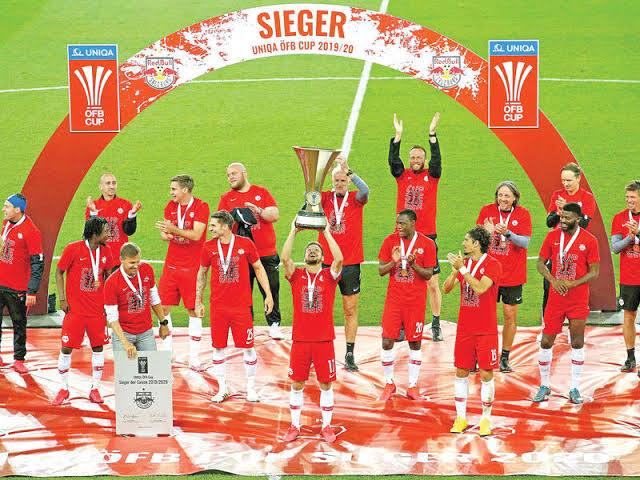Red Bull’s Footballing Innovation
In the ever-evolving world of football, one entity has stood out as a unique and innovative force – Red Bull. This energy drink giant has not only entered the football arena but also redefined the rules of engagement, bringing with it a distinct approach to club ownership and development. Red Bull’s influence in football is remarkable and continues to shape the game in unprecedented ways.
Thank you for reading this post, don't forget to subscribe!
Red Bull’s journey into football began with the acquisition of SV Austria Salzburg in 2005, which was transformed into Red Bull Salzburg. This marked the start of a new era where the company’s involvement went far beyond financial support. Red Bull introduced an intensive playing style and implemented an extensive youth development system, creating a new footballing culture.Red Bull’s Footballing Innovation
The results were rapid, with the club securing domestic success and making a notable impact on the European stage.Expanding their football empire, Red Bull ventured into the United States by founding the New York Red Bulls in 2010. This not only brought a level of professionalism and marketing to Major League Soccer (MLS) but also redefined club ownership. Red Bull’s Footballing Innovation
Red Bull invested heavily in youth academies, fostering young talent and contributing to the growth of soccer in a nation where other sports traditionally held sway.In 2009, Red Bull made a bold move by acquiring RB Leipzig in Germany, a club that rapidly ascended through the football pyramid.Red Bull’s Footballing Innovation
While their rise sparked debates about the ethics of football ownership, Leipzig’s success demonstrated the potential of Red Bull’s model. They reached the Bundesliga and participated in the Champions League, challenging the status quo of European football.One of the most intriguing aspects of Red Bull’s involvement in football is its global approach. Red Bull’s Footballing Innovation
Through the Red Bull Global Soccer network, their clubs and academies are interconnected, promoting a consistent style of play, player development, and coaching methodologies. This innovative approach acts like a multinational corporation within the footballing world, setting Red Bull apart from traditional ownership models.Red Bull’s Footballing Innovation
Critics argue that Red Bull’s entry into football erodes the local essence of the sport, which is often deeply rooted in communities and history. The rebranding of clubs and the introduction of corporate identities can create tension. However, supporters see the positive impact on player development, professionalism, and the globalization of football.Red Bull’s Footballing Innovation
In conclusion, Red Bull’s investment in football continues to be a transformative force. It challenges conventional ownership models by introducing a more corporate approach while emphasizing youth development, professionalism, and maintaining consistency across its clubs worldwide. Whether one views it as a positive or negative force in football, there’s no denying the significant impact Red Bull has had on the sport. As the football world evolves, Red Bull’s unique model will remain a topic of discussion and debate, highlighting the ongoing changes in the beautiful game.Red Bull’s Footballing Innovation
Red Bull’s involvement in football is not without its challenges. Critics argue that it can dilute the essence of the sport, leading to concerns about over-commercialization and the loss of authentic fan culture. The rebranding of clubs and the imposition of corporate identities can sometimes alienate long-standing supporters. Red Bull’s Footballing Innovation
The company’s approach may not be universally embraced, but it undeniably offers a fresh perspective on football’s future.On the flip side, Red Bull’s positive impact on player development is evident. The commitment to youth academies and consistent coaching methodologies has led to the emergence of talented players who may have otherwise gone unnoticed.
This approach benefits not only Red Bull’s teams but also contributes to the broader football community by nurturing young talent and offering them opportunities to thrive.Furthermore, the international network established by Red Bull among its clubs is a testament to their commitment to innovation. This network enables the free exchange of talent, scouting, and sharing of best practices across borders. Players can move between clubs within the network, gaining experience in various leagues and styles of play. This level of global cooperation is unique in the footballing world and has the potential to reshape how clubs operate.
In conclusion, Red Bull’s influence in football is a reflection of the changing nature of the sport. While it challenges the traditional ownership model and sparks debates about authenticity and tradition, it undeniably advances the game in terms of player development, professionalism, and global reach.
Red Bull’s investment in football may be polarizing, but its innovative approach continues to shape the ever-evolving landscape of the beautiful game. Whether viewed as a commercial force or a positive contributor to football’s evolution, Red Bull’s impact on the sport is undeniable and continues to be a topic of discussion within the footballing community. As football continues to evolve, Red Bull’s unique model offers a glimpse into the sport’s future, emphasizing that innovation and fresh perspectives will play a pivotal role in shaping its direction.
